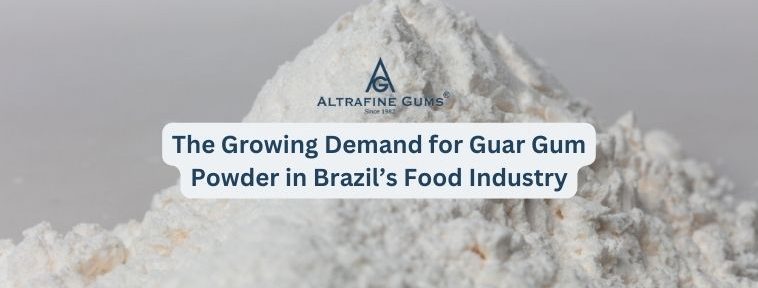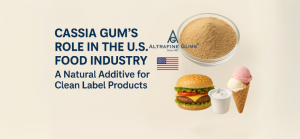- Home
- Guar Gum Powder
- The Growing Demand for Guar Gum Powder in Brazil’s Food Industry

The Growing Demand for Guar Gum Powder in Brazil’s Food Industry
Table of Contents
Brazil’s food industry has witnessed a significant shift toward healthier, natural, and clean-label ingredients in recent years. As part of this transformation, guar gum powder has emerged as a key component in various food applications. Derived from the guar bean, guar gum is a natural polysaccharide that acts as a thickening, stabilizing, and emulsifying agent. Its versatile nature and ability to enhance food textures have made it a popular choice for food manufacturers in Brazil, especially as consumers become more health-conscious and demand transparent, sustainable food products. This article explores the increasing demand for guar gum powder in Brazil’s food sector, its various applications, and the challenges and opportunities in this growing market.
Guar Gum Powder: A Versatile Ingredient in Brazil’s Food Sector
Guar gum powder is renowned for its multifunctional properties, making it an ideal ingredient in various food products across Brazil. It serves as a thickener, stabilizer, emulsifier, and even a texturizer. The Brazilian food industry uses guar gum in a wide range of products, including dairy, baked goods, beverages, sauces, and processed foods. Its ability to improve texture, consistency, and shelf life without compromising taste or nutritional value has positioned it as a staple in food manufacturing.
In addition to its core functions, guar gum powder is valued for being a plant-based, gluten-free, and non-GMO ingredient, aligning with the preferences of modern consumers who seek healthier and more natural food choices. As Brazil continues to embrace clean-label products, guar gum offers a solution for food producers looking to meet the evolving needs of the market.
Applications of Guar Gum in Brazilian Food Products
Guar gum’s versatility allows it to be used in various food categories, contributing to the creation of products that appeal to diverse consumer preferences in Brazil.
- Dairy Products:In yogurt, ice cream, and other dairy-based items, guar gum helps improve creaminess, enhance texture, and prevent the formation of ice crystals. Its thickening properties allow dairy products to maintain their desired consistency and stability over time, even with lower fat content.
- Baked Goods: Guar gum is widely used in gluten-free baking, where it replaces gluten as a binding agent. In Brazil, where gluten-free products are gaining popularity, guar gum ensures that baked goods have the elasticity and texture consumers expect, without the use of wheat or other gluten-containing ingredients.
- Beverages:In juices and ready-to-drink beverages, guar gum acts as a stabilizer to keep the ingredients uniformly mixed. This is particularly useful in Brazil’s growing market for functional and nutritional beverages, where guar gum helps maintain product consistency.
- Sauces and Dressings: Guar gum is a key ingredient in sauces, dressings, and condiments, where it enhances viscosity and prevents separation of oil and water-based components. This application ensures that sauces have a smooth and cohesive texture, which is essential for both taste and appearance.
- Processed Foods:Guar gum is commonly used in processed foods like soups, gravies, and processed meats to improve moisture retention, enhance texture, and extend shelf life. Its ability to act as a thickener and emulsifier makes it a valuable additive in this segment of the food industry.

Brazil’s Shift toward Natural and Clean-Label Ingredients
As the Brazilian food industry adapts to the growing demand for clean-label products, guar gum is gaining traction as a preferred ingredient due to its natural origin. Consumers in Brazil are increasingly seeking products that are free from artificial additives, preservatives, and harmful chemicals. This trend is driving food manufacturers to replace synthetic ingredients with natural alternatives like guar gum.
Guar gum’s role as a clean-label ingredient lies in its ability to provide the desired functionality in food products—such as thickening, stabilizing, and emulsifying—without the need for artificial chemicals. Its plant-based nature appeals to both health-conscious consumers and environmentally aware brands. Additionally, as a non-GMO ingredient, guar gum meets the stringent demands of consumers who prioritize the safety and transparency of the ingredients in their food.
The Brazilian food industry’s shift toward natural ingredients is not only about meeting consumer demands but also about staying competitive in the global market. As the country’s food exports grow, adhering to international standards and certifications that prioritize natural ingredients has become essential. Guar gum fits perfectly into this narrative, providing a solution for manufacturers who want to offer both local and international consumers clean, healthy, and high-quality products.
The Role of Guar Gum in Gluten-Free and Health-Conscious Foods
Brazil’s food industry is experiencing a surge in demand for gluten-free and health-conscious products. With an increasing number of consumers adopting gluten-free diets due to health concerns or dietary preferences, the need for high-quality gluten alternatives has grown. Guar gum plays a pivotal role in this space by offering a plant-based, gluten-free ingredient that enhances the texture and quality of gluten-free products.
In gluten-free baking, guar gum acts as a replacement for gluten, providing the binding and structural properties that gluten normally offers. This makes it easier for bakers to produce breads, pastries, and other baked goods with the desired consistency, elasticity, and mouthfeel that consumers expect. Guar gum also improves the moisture retention of gluten-free products, ensuring they stay fresher for longer periods.
For health-conscious consumers, guar gum is valued not only for being gluten-free but also for its role in reducing fat content without compromising texture. In low-fat or reduced-calorie foods, guar gum can be used to create a creamy, indulgent mouthfeel while maintaining a healthier nutritional profile. This makes it a go-to ingredient for manufacturers looking to develop products that meet the demands of health-conscious consumers without sacrificing quality.
Challenges and Opportunities in the Brazilian Guar Gum Market
While the demand for guar gum in Brazil’s food industry continues to grow, there are challenges that manufacturers and suppliers must navigate. One of the main challenges is the fluctuation in guar gum prices, which can be influenced by factors such as changes in global demand, crop yields, and market conditions in key producing countries like India.
Another challenge is the need for consistent quality. As guar gum is a natural ingredient, variations in quality can occur due to factors such as the source of the guar beans, processing methods, and storage conditions. Brazilian food manufacturers must work closely with their suppliers to ensure they receive guar gum of consistent quality to maintain product standards.
Despite these challenges, the opportunities in the Brazilian guar gum market are immense. As the country’s food industry shifts toward natural, gluten-free, and health-conscious products, guar gum will continue to play a critical role. The growing demand for clean-label products, both domestically and for export, presents an opportunity for manufacturers to expand their product lines and tap into new markets using guar gum as a key ingredient.
FAQs About Guar Gum Powder
What makes guar gum powder a popular ingredient in Brazil’s food industry?
Guar gum is valued for its versatility as a thickening, stabilizing, and emulsifying agent. It helps improve the texture, consistency, and shelf life of a wide range of food products, from dairy to baked goods, without compromising nutritional value.
How is guar gum used in gluten-free products in Brazil?
In gluten-free baking, guar gum replaces gluten as a binding agent, providing elasticity and structure to baked goods. It also improves moisture retention, ensuring that gluten-free products stay fresh and maintain their texture.
Why are Brazilian consumers shifting toward clean-label ingredients?
Brazilian consumers are becoming more health-conscious and environmentally aware. They prefer products made with natural, non-GMO ingredients that are free from artificial additives and preservatives. Guar gum fits perfectly into this trend as a natural, plant-based ingredient.
What are the main challenges for guar gum suppliers in Brazil?
Fluctuations in guar gum prices and ensuring consistent quality are the primary challenges for guar gum suppliers. Manufacturers need to source guar gum from reliable suppliers and maintain strong quality control to ensure their products meet industry standards.
What role does guar gum play in low-fat and health-conscious foods?
Guar gum is used in low-fat and reduced-calorie foods to create a creamy texture without the need for added fats. It helps maintain the mouth feel and quality of products while supporting healthier nutritional profiles.
Conclusion
guar gum powder is becoming an essential ingredient in Brazil’s evolving food industry. Its versatility, natural origin, and role in gluten-free and health-conscious foods make it a valuable asset for food manufacturers. As the demand for clean-label and healthy products continues to rise, guar gum will remain a key component in shaping the future of Brazil’s food sector.




